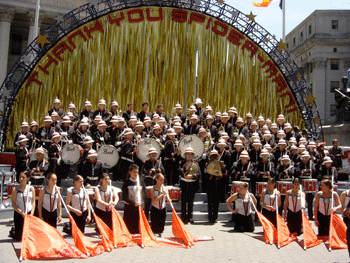Major films such as “Drumline” and the “American Pie” franchise have brought national attention to the marching band endeavor while countless other movies feature snippets of bands in memorable scenes.
Millions of people worldwide caught web fever in early May, getting wrapped up in the excitement generated by the opening of the movie “Spider-Man 3.” The blockbuster movie shattered all box-office records with its worldwide weekend debut of a staggering $382 million. Wouldn’t it be cool to be a part of that excitement, to know you had a role in the production of a movie seen by millions around the globe?
The members of the Port Chester (N.Y.) High School Marching Band know that sense of accomplishment. They performed in the scene where Spider-Man received the key to the city. You’ll see the band marching into place and standing on the risers in New York’s Foley Square. The band also played for the arrival of the police chief and performed the “Spider-Man” theme when the hero arrived.
The band’s filmography goes back quite some time. In 1955, the band appeared in “Toast of the Town,” later renamed “The Ed Sullivan Show.” The band also took part in the 1994 film remake of “Miracle on 34th Street.”
Spidey Senses
The Port Chester Band scored a major coup when Sony Pictures Studios invited it to take a starring role in what all knew would be a huge commercial success. The Sony representative had sought a New York-area band due to its filming in Manhattan and had heard of Port Chester because of its prior engagements. Under the direction of Robert Vitti, the band pre-recorded soundtracks for the street beat, the “Spider-Man” theme and “Mechanized Infantry,” by David McBain, a classic march the band has performed for several years.
Kevin Kraut, a trumpet player in the Port Chester High School Band, says he didn’t quite believe he would be in the movie until “we finished all the recording sessions and started planning the film dates. Then I got excited, thinking how great this would be for the band’s reputation.”
But it wasn’t all fun and games during the four-day shoot. “We had to practice our marching, and we also had to look good,” says marimba player Isabel Kaufman. “We all had to have squeaky-clean uniforms. On the set, there are directions being called out every five minutes. We had to either sit or stand for hours at a time. When we had breaks, everyone would run into the shade. I have to admit that waking up at 4:30 and leaving at 5:00 or 6:00 at night is very tiring. I tried not to get too caught up in being tired because we were in a once-in-a-lifetime experience.”
Despite all of that effort, rather little of any filming sequence ever makes it into the final movie. Kaufman estimates that at least 75% of what the band filmed “went straight to the cutting room floor.” Kraut concurs. “I lost track of how many takes we filmed,” he says. “There had to be dozens of them. We filmed a scene where Sandman was attacking the ceremony, and we had to run for our lives from the grandstand. I’m surprised we didn’t destroy any instruments in the process … and none of that made it into the movie.”
Watching the final sequence at the theater made up for the tired feet and seemingly endless days. “When the movie was released, the band bought out the theater, and we filled every seat with band members, staff and parents,” Kraut says. “There was a big uproar when we came on the screen. The thing I like most about this whole experience is that the band is immortalized by being in the movie, even if the people watching it don’t know who we are or where we’re from.”
Rubber Dummies & Prime Rib
Working in the movies definitely has its perks, recounts Mike Reynolds, who was a member of the Santa Ana (Calif.) Winds Youth Band. In the 1994 film “Witch Hunt” with Dennis Hopper, the band filmed a scene at Los Angeles’ John Anson Ford Amphitheatre, serving as the marching band in the orchestra pit. Reynolds remembers having a front row seat to watch the filming of the scene where Eric Bogosian crawled out of the abdomen of a rubber Eric Bogosian dummy. “This was a cool effect to see up close,” he says.
Reynolds also has vivid recollections of schmoozing with the stars during meals on the set. For example, Dennis Hopper had stood behind him in line. Reynolds had also sat across from director Paul Schrader and laughed over the extras eating “roast beef in a box” while they “shoved prime rib into [their] faces,” he says.
But just like Kaufman and Kraut, Reynolds also experienced the downsides of filmmaking. “They gave us all 1950s-era haircuts but only to our shako lines, like one of those rice bowl cuts my mom used to give me,” he says. “We looked freaky for a few weeks afterwards.”
Meet Hollywood’s Band
When it comes to marching bands in the movies, no band can lay credit to being “Hollywood’s Band” like the Riverside Community College Band (RCC). Based just east of Los Angeles, the band is perfectly suited geographically for many movie and television scenes.
The film credits for this band seem endless. Under the direction of Gary Locke, the marching band has appeared in a diverse group of movies. These include the original “Austin Powers: International Man of Mystery,” in which Mike Meyers serves as the band’s drum major in the opening movie credits; the political comedy “Wag the Dog”; and the yet-to-be-released “Bratz: The Movie,” based on the hit Saturday morning cartoon show and the popular Bratz dolls.
The RCC Drum Line appears on the DVD for the movie “Drumline” and in the music video for the song “She’s Blowin’ Me Up With Her Love” with JC Chasez of *NSYNC fame. “Imagine the thrill of being a college drummer and being hired to shoot a music video for two nights, all night long, with JC and actress Tara Reid,” Locke says.
In the Garry Marshall film, “The Other Sister,” one of the characters in the film loved marching bands and especially RCC. The character decorated his apartment with photos of the band, listened to the band’s recording of “76 Trombones,” and, in the finale of the film, hired RCC to march down the street in front of the church where he and his bride were married. Marshall bused the entire unit to San Francisco for three days of shooting, picking up all expenses, Locke says. Marshall also used the band in his movies “Dear God” and “Princess Diaries 2.”
Perhaps RCC’s most notorious appearances occurred in the “American Pie” franchise. In “American Pie Presents: Band Camp,” members of the band served as members of all the bands. RCC’s arranger, Wayne Downey, wrote the music for the film and served as one of the band directors.
“In the ‘Band Camp’ movie, we worked for many, many days on the project, earning the band a good amount of money, and we were involved in a lot of decisions about doing things ‘the way a high school band would do them,’” Locke says. “Naturally, there are a lot of things over which we have no control, but the marching scenes in that project are pretty realistic. We wrote the drill, marched it and really played the music in that film.”
The “Reel” Value
According to Gary Locke, RCC’s involvement in these Hollywood projects has helped its image more than hurt it. “Yes, some of these projects are silly, but they sure help our recruiting,” he says. The students benefit the most from working on these gigs. “It’s easy to figure out how much of a donation these movies make to our band fund, but what of the value to our kids?” he asks. “That’s another story entirely. How do you put a value on the opportunity to work ‘up close and personal’ with Jim Carrey on ‘The Truman Show’? Or with Mike Meyers or Dustin Hoffman? We were in his movie ‘Hero’ and played ‘Happy Birthday’ on the set for Geena Davis, with Andy Garcia playing bass drum. And we worked with Dustin Hoffman again on the movie ‘Wag the Dog.’”
Locke believes that students learn discipline and perseverance from working on these films. “These experiences stay with kids for a long time,” he says. “Who said marching band was just a bunch of geeky kids? Marching band brings opportunities. It teaches that success is oftentimes preparation meeting opportunity. We are always on time, prepared and ready to go. So we get re-hired, over and over again. And, if nothing else, the band members learn to be flexible. They learn discipline, commitment and follow-through. What employer doesn’t want those qualities in their employees?”
“And this can be learned in marching band? In ‘Hollywood’s Band?’ Wow! Stop the presses!”
Photo by Lynn Kraut. All rights reserved.


